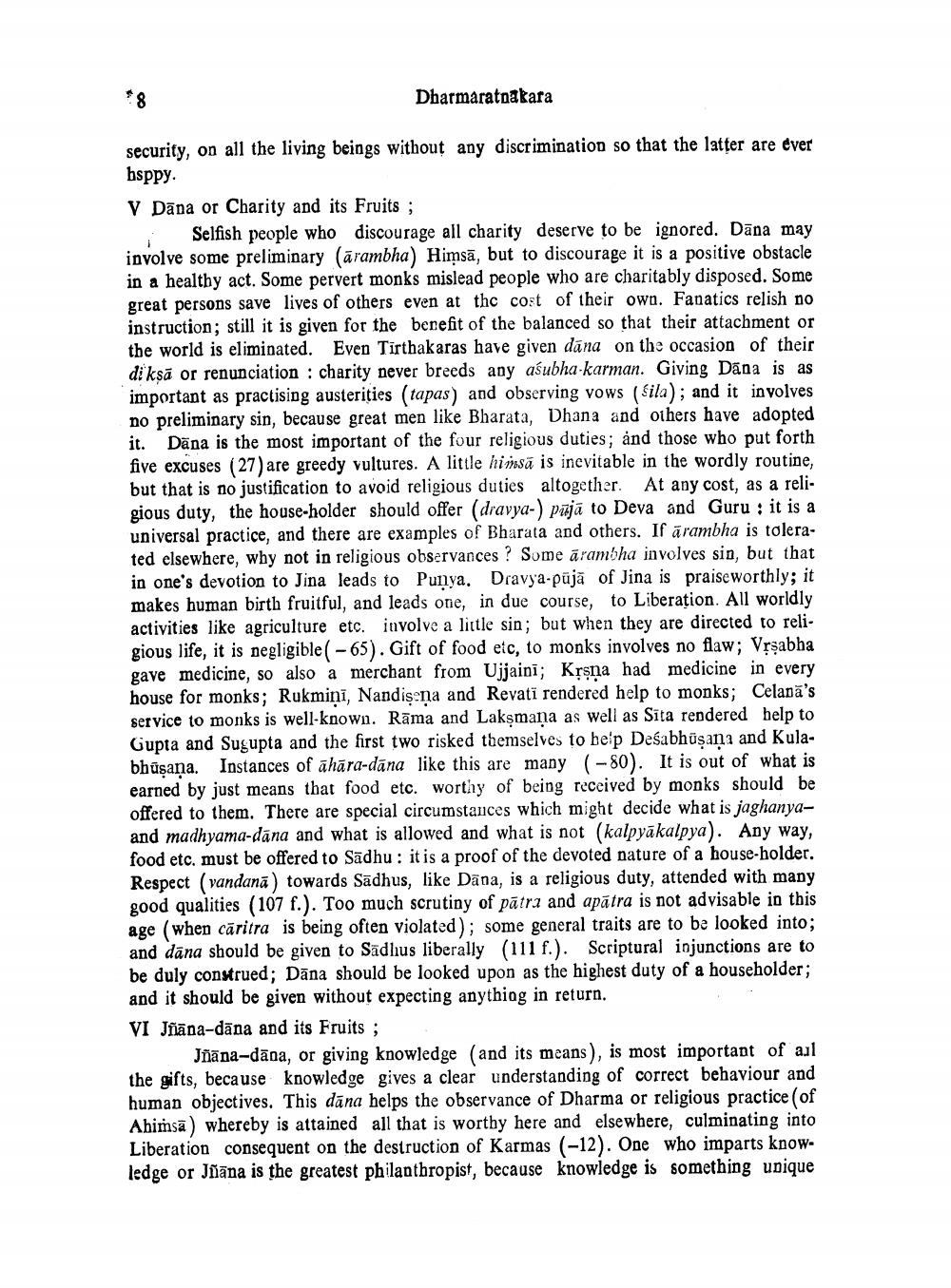________________
Dharmaratnakara
security, on all the living beings without any discrimination so that the latter are ever hsppy. V Dāna or Charity and its Fruits ;
Selfish people who discourage all charity deserve to be ignored. Dāna may involve some preliminary (ārambha) Himsā, but to discourage it is a positive obstacle in a healthy act. Some pervert monks mislead people who are charitably disposed. Some great persons save lives of others even at the cost of their own. Fanatics relish no instruction; still it is given for the benefit of the balanced so that their attachment or the world is eliminated. Even Tirthakaras have given dána on the occasion of their diksā or renunciation : charity never breeds any aśubha-karman. Giving Dāna is as important as practising austerities (tapas) and observing vows (bila); and it involves no preliminary sin, because great men like Bharata, Dhana and others have adopted it. Dāna is the most important of the four religious duties; and those who put forth five excuses (27) are greedy vultures. A little himsa is inevitable in the wordly routine, but that is no justification to avoid religious duties altogether. At any cost, as a religious duty, the house-holder should offer (dravya-) pūjá to Deva and Guru : it is a universal practice, and there are examples of Bharata and others. If ārambha is tolerated elsewhere, why not in religious observances ? Some arambha involves sin, but that in one's devotion to Jina leads to Punya. Dravya-pūjā of Jina is praiseworthly; it makes human birth fruitful, and leads otie, in due course, to Liberation. All worldly activities like agriculture etc. involve a little sin; but when they are directed to religious life, it is negligible( - 65). Gift of food etc, to monks involves no flaw; Vrsabha gave medicine, so also a merchant from Ujjaini; Krsna had medicine in every house for monks; Rukmini, Nandisana and Revati rendered help to monks; Celana's service to monks is well-known. Rāma and Lakşmaņa as well as Sīta rendered help to Gupta and Sugupta and the first two risked themselves to help Deśabhūsana and Kulabhūsana. Instances of āhāra-dāna like this are many (-80). It is out of what is earned by just means that food etc. worthy of being received by monks should be offered to them. There are special circumstances which might decide what is jaghanyaand madhyama-dāna and what is allowed and what is not (kalpyākalpya). Any way, food etc. must be offered to Sadhu : it is a proof of the devoted nature of a house-holder. Respect (vandanā towards Sadhus, like Dāna, is a religious duty, attended with many good qualities (107 f.). Too much scrutiny of pātra and apātra is not advisable in this age (when caritra is being often violated); some general traits are to be looked into; and dāna should be given to Sadhus liberally (111 f.). Scriptural injunctions are to be duly construed; Dāna should be looked upon as the highest duty of a householder; and it should be given without expecting anything in return. VI Jžāna-dāna and its Fruits ;
Jñāna-dāna, or giving knowledge (and its means), is most important of all the gifts, because knowledge gives a clear understanding of correct behaviour and human objectives. This dāna helps the observance of Dharma or religious practice (of Ahimsā) whereby is attained all that is worthy here and elsewhere, culminating into Liberation consequent on the destruction of Karmas (-12). One who imparts knowledge or Jñāna is the greatest philanthropist, because knowledge is something unique




